Some Things Never Change…Or Do They?: Marathon Read 2018

On the Pattee Mall on Thursday, September 13th, Penn State students, faculty, and staff gathered with members of the State College community to celebrate the Marathon Read, a twelve-hour event that ran from 10:00 am to 10:00 p.m. The theme of this year’s event was “Pages from 1968." CALS Undergraduate Intern Emily Morrison reflects on her experience at the read.
For the first few weeks of September, it seemed as if the clouds that dumped rain on State College were fixed in their place, only stopping long enough to allow the residents below to dry 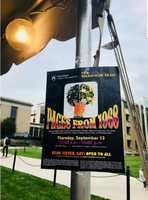 off before opening up again. The week of the Marathon Read threatened similar weather: meteorologists warned of thunder that could rumble through the area, and the English Department hurriedly prepared materials and volunteers alike in case lightning forced the event inside. But in the early hours of September 13th, the mist seemed to settle on the rich grasses of the Pattee Mall as readers and organizers started gathering, and as the event began, the sun poked through for perhaps the first time in weeks, extending its rays out to the white tent situated on the lawn.
off before opening up again. The week of the Marathon Read threatened similar weather: meteorologists warned of thunder that could rumble through the area, and the English Department hurriedly prepared materials and volunteers alike in case lightning forced the event inside. But in the early hours of September 13th, the mist seemed to settle on the rich grasses of the Pattee Mall as readers and organizers started gathering, and as the event began, the sun poked through for perhaps the first time in weeks, extending its rays out to the white tent situated on the lawn.
This year, the Marathon Read’s theme celebrated the year 1968 and gave listeners, readers, volunteers, and organizers the opportunity to reflect on the past. An event rich with tradition since its inception seven years ago, The Marathon Read unfolded much as it usually does, bringing together members from the Penn State community and even beyond. Between timer beeps signaling the start of a new reader, there are inevitably passersby who pause when they see the tent and hear the speakers; some of them take out their headphones and stop briefly before continuing on. Others, like I was at my first Marathon Read four years ago, are drawn in by curiosity and end up listening or reading themselves. Local legends like Sue Paterno - a proponent of the College of the Liberal Arts who opens the event each year - came together with students, while members of the community, including the mayor of State College, sat with varsity teams and creative writers and pondered what has come before us to celebrate that which we’ve 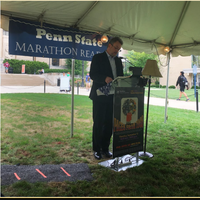 accomplished and, perhaps more importantly, to recognize the work that is still to be done.
accomplished and, perhaps more importantly, to recognize the work that is still to be done.
During difficult times, the present can seem like an oppressive force in our lives. While reminiscing about the past can be a challenge in many ways, it also frees us to explore and remind ourselves of what we find pertinent. What did our society look like fifty years ago, and what do we want it to look like now? What’s changed, and what hasn’t? Being able to facilitate these thoughts and discussions as a campus community is one of the greatest tools we possess to help mold the past and present into a better future. At the Marathon Read, reminiscence becomes a community action that feels sheltered by the tent filled with the soft, familiar warmth of string lights. The voices of readers echo through the tent but not far beyond, creating a unique space of tranquility and contemplation. This year, it seemed as if the Marathon Read was keeping away more than just the rain.
The social and political unrest that bereaved 1968 is in part what made it so memorable, as it was a year marked by nationwide student demonstrations, the assassination of Dr. Martin Luther King, Jr., and the narrowly-won election of Richard Nixon, among notable events. Who are we? was a serious question for Americans in that year. In our current sociopolitical climate marked by derision and partisanism, seeing similarities and differences between events like, for example, the civil rights movement and the “Me Too” movement is as imperative as ever, for it provides us the opportunity to study the ways in which a distant political sphere can be disrupted by the 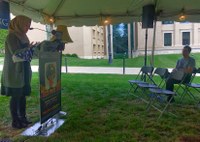 social for the sake of liberation. Marathon Read supporter and English Department Head Mark Morrisson noted, however, that an important facet of the Marathon Read is the “opportunity to bring everyone together”, incorporating both on- and off-campus groups which may not congregate normally. Senior and women’s gymnastics team member Jessica Jones echoed the feelings of excitement that can come from participating in the Read. Making her first ever visit to the event this year, she embraced the ways in which our community comes together to celebrate and reflect in such a unique way.
social for the sake of liberation. Marathon Read supporter and English Department Head Mark Morrisson noted, however, that an important facet of the Marathon Read is the “opportunity to bring everyone together”, incorporating both on- and off-campus groups which may not congregate normally. Senior and women’s gymnastics team member Jessica Jones echoed the feelings of excitement that can come from participating in the Read. Making her first ever visit to the event this year, she embraced the ways in which our community comes together to celebrate and reflect in such a unique way.
The first and only novel to be shared during the Read this year was Philip K. Dick’s Do Androids Dream of Electric Sheep?, an Aldous Huxley-esque exploration of society popularized by the noir 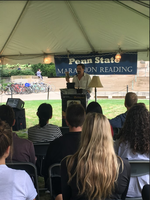 sci-fi film Blade Runner. What does technological advancement do to our humanity? What even was humanity to start with? These may be questions that were of predominant concern in 1968, but as Professor of English Richard Doyle explained in his opening remarks about the book, there has always been the hope that we may have some “epiphany” on these topics. “But we’re still waiting,” Doyle remarked.
sci-fi film Blade Runner. What does technological advancement do to our humanity? What even was humanity to start with? These may be questions that were of predominant concern in 1968, but as Professor of English Richard Doyle explained in his opening remarks about the book, there has always been the hope that we may have some “epiphany” on these topics. “But we’re still waiting,” Doyle remarked.
Other authors featured throughout the day were journalist Joan Didion, Pulitzer-prize winning poet Gwendolyn Brooks, and Nobel Prize winning short story writer Alice Munro. The works of Jorge Luis Borges, essayist and novelist Susan Sontag, and poet Etheridge Knight helped close out the half day of reading and listening together. A facet of the Marathon Read that was a bit different this year, 2018 marked the first year that the event was held for twelve hours instead of twenty-four. Moreover, the theme for the event, which normally stands alone, is one tied to the theme of Remembering 1968: Moments of Change, a series that will feature a wide array of different programs hosted by the Penn State College of the Liberal Arts throughout this academic year.
I expected these changes to change the feel of the read; as an event that usually stands proudly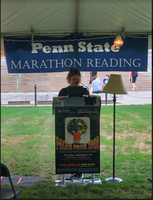 alone, how would it be able to contextualize a whole series? As I sat in my seat, however, a shy freshman tapped her classmate on the shoulder, signaling that it was her turn to read. The new reader spoke clearly, and became more confident with every word. In her I saw a younger version of myself standing at the podium. The Marathon Read may have experienced changes, but so have I. The modified Marathon Read marked the beginning of an exciting future for the College of the Liberal Arts, just as my Penn State career will mark only the beginning of a better future.
alone, how would it be able to contextualize a whole series? As I sat in my seat, however, a shy freshman tapped her classmate on the shoulder, signaling that it was her turn to read. The new reader spoke clearly, and became more confident with every word. In her I saw a younger version of myself standing at the podium. The Marathon Read may have experienced changes, but so have I. The modified Marathon Read marked the beginning of an exciting future for the College of the Liberal Arts, just as my Penn State career will mark only the beginning of a better future.
Despite these differences in structure and theme, the Marathon Read still embraces the power of community and self-critique with which it was founded; perhaps this is what attendees hope to find at the event - a consistency within the change. Being critical of the past and scrutinizing the present can have an invaluable influence on the future. The Marathon Read is not an end point, but a starting one. As the lights went out in the tent and the rain began to fall once more, the Marathon Read community dispersed, returning to their regularly scheduled programming a little sooner than they had in years past. But, like always, they could take away with them the comfort that the podium, the speakers, and the Read would be set up again next year, just as they’d been in the past.

On the Pattee Mall on Thursday, September 13th, Penn State students, faculty, and staff gathered with members of the State College community to celebrate the Marathon Read, a twelve-hour event that ran from 10:00 am to 10:00 p.m. The theme of this year’s event was “Pages from 1968." CALS Undergraduate Intern Emily Morrison reflects on her experience at the read.
For the first few weeks of September, it seemed as if the clouds that dumped rain on State College were fixed in their place, only stopping long enough to allow the residents below to dry  off before opening up again. The week of the Marathon Read threatened similar weather: meteorologists warned of thunder that could rumble through the area, and the English Department hurriedly prepared materials and volunteers alike in case lightning forced the event inside. But in the early hours of September 13th, the mist seemed to settle on the rich grasses of the Pattee Mall as readers and organizers started gathering, and as the event began, the sun poked through for perhaps the first time in weeks, extending its rays out to the white tent situated on the lawn.
off before opening up again. The week of the Marathon Read threatened similar weather: meteorologists warned of thunder that could rumble through the area, and the English Department hurriedly prepared materials and volunteers alike in case lightning forced the event inside. But in the early hours of September 13th, the mist seemed to settle on the rich grasses of the Pattee Mall as readers and organizers started gathering, and as the event began, the sun poked through for perhaps the first time in weeks, extending its rays out to the white tent situated on the lawn.
This year, the Marathon Read’s theme celebrated the year 1968 and gave listeners, readers, volunteers, and organizers the opportunity to reflect on the past. An event rich with tradition since its inception seven years ago, The Marathon Read unfolded much as it usually does, bringing together members from the Penn State community and even beyond. Between timer beeps signaling the start of a new reader, there are inevitably passersby who pause when they see the tent and hear the speakers; some of them take out their headphones and stop briefly before continuing on. Others, like I was at my first Marathon Read four years ago, are drawn in by curiosity and end up listening or reading themselves. Local legends like Sue Paterno - a proponent of the College of the Liberal Arts who opens the event each year - came together with students, while members of the community, including the mayor of State College, sat with varsity teams and creative writers and pondered what has come before us to celebrate that which we’ve  accomplished and, perhaps more importantly, to recognize the work that is still to be done.
accomplished and, perhaps more importantly, to recognize the work that is still to be done.
During difficult times, the present can seem like an oppressive force in our lives. While reminiscing about the past can be a challenge in many ways, it also frees us to explore and remind ourselves of what we find pertinent. What did our society look like fifty years ago, and what do we want it to look like now? What’s changed, and what hasn’t? Being able to facilitate these thoughts and discussions as a campus community is one of the greatest tools we possess to help mold the past and present into a better future. At the Marathon Read, reminiscence becomes a community action that feels sheltered by the tent filled with the soft, familiar warmth of string lights. The voices of readers echo through the tent but not far beyond, creating a unique space of tranquility and contemplation. This year, it seemed as if the Marathon Read was keeping away more than just the rain.
The social and political unrest that bereaved 1968 is in part what made it so memorable, as it was a year marked by nationwide student demonstrations, the assassination of Dr. Martin Luther King, Jr., and the narrowly-won election of Richard Nixon, among notable events. Who are we? was a serious question for Americans in that year. In our current sociopolitical climate marked by derision and partisanism, seeing similarities and differences between events like, for example, the civil rights movement and the “Me Too” movement is as imperative as ever, for it provides us the opportunity to study the ways in which a distant political sphere can be disrupted by the  social for the sake of liberation. Marathon Read supporter and English Department Head Mark Morrisson noted, however, that an important facet of the Marathon Read is the “opportunity to bring everyone together”, incorporating both on- and off-campus groups which may not congregate normally. Senior and women’s gymnastics team member Jessica Jones echoed the feelings of excitement that can come from participating in the Read. Making her first ever visit to the event this year, she embraced the ways in which our community comes together to celebrate and reflect in such a unique way.
social for the sake of liberation. Marathon Read supporter and English Department Head Mark Morrisson noted, however, that an important facet of the Marathon Read is the “opportunity to bring everyone together”, incorporating both on- and off-campus groups which may not congregate normally. Senior and women’s gymnastics team member Jessica Jones echoed the feelings of excitement that can come from participating in the Read. Making her first ever visit to the event this year, she embraced the ways in which our community comes together to celebrate and reflect in such a unique way.
The first and only novel to be shared during the Read this year was Philip K. Dick’s Do Androids Dream of Electric Sheep?, an Aldous Huxley-esque exploration of society popularized by the noir  sci-fi film Blade Runner. What does technological advancement do to our humanity? What even was humanity to start with? These may be questions that were of predominant concern in 1968, but as Professor of English Richard Doyle explained in his opening remarks about the book, there has always been the hope that we may have some “epiphany” on these topics. “But we’re still waiting,” Doyle remarked.
sci-fi film Blade Runner. What does technological advancement do to our humanity? What even was humanity to start with? These may be questions that were of predominant concern in 1968, but as Professor of English Richard Doyle explained in his opening remarks about the book, there has always been the hope that we may have some “epiphany” on these topics. “But we’re still waiting,” Doyle remarked.
Other authors featured throughout the day were journalist Joan Didion, Pulitzer-prize winning poet Gwendolyn Brooks, and Nobel Prize winning short story writer Alice Munro. The works of Jorge Luis Borges, essayist and novelist Susan Sontag, and poet Etheridge Knight helped close out the half day of reading and listening together. A facet of the Marathon Read that was a bit different this year, 2018 marked the first year that the event was held for twelve hours instead of twenty-four. Moreover, the theme for the event, which normally stands alone, is one tied to the theme of Remembering 1968: Moments of Change, a series that will feature a wide array of different programs hosted by the Penn State College of the Liberal Arts throughout this academic year.
I expected these changes to change the feel of the read; as an event that usually stands proudly alone, how would it be able to contextualize a whole series? As I sat in my seat, however, a shy freshman tapped her classmate on the shoulder, signaling that it was her turn to read. The new reader spoke clearly, and became more confident with every word. In her I saw a younger version of myself standing at the podium. The Marathon Read may have experienced changes, but so have I. The modified Marathon Read marked the beginning of an exciting future for the College of the Liberal Arts, just as my Penn State career will mark only the beginning of a better future.
alone, how would it be able to contextualize a whole series? As I sat in my seat, however, a shy freshman tapped her classmate on the shoulder, signaling that it was her turn to read. The new reader spoke clearly, and became more confident with every word. In her I saw a younger version of myself standing at the podium. The Marathon Read may have experienced changes, but so have I. The modified Marathon Read marked the beginning of an exciting future for the College of the Liberal Arts, just as my Penn State career will mark only the beginning of a better future.
Despite these differences in structure and theme, the Marathon Read still embraces the power of community and self-critique with which it was founded; perhaps this is what attendees hope to find at the event - a consistency within the change. Being critical of the past and scrutinizing the present can have an invaluable influence on the future. The Marathon Read is not an end point, but a starting one. As the lights went out in the tent and the rain began to fall once more, the Marathon Read community dispersed, returning to their regularly scheduled programming a little sooner than they had in years past. But, like always, they could take away with them the comfort that the podium, the speakers, and the Read would be set up again next year, just as they’d been in the past.